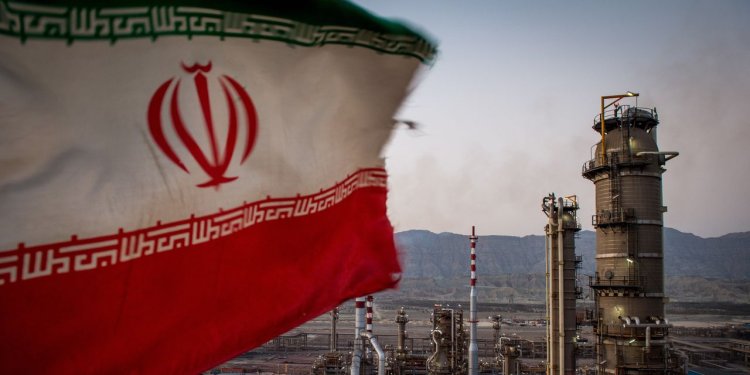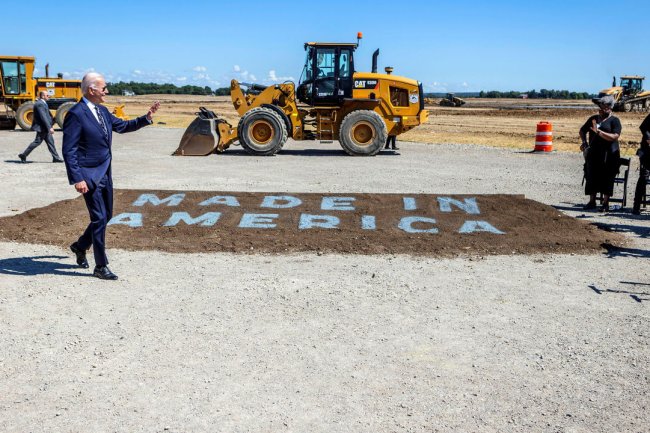Iran Floods Global Markets With Cheap Oil as Saudi Arabia Cuts Output
Iranian crude exports have hit a five-year high in recent months as the country ships more oil to China and other buyers Iran’s supply of oil to the global energy market has surged. Photo: ALI MOHAMMADI/BLOOMBERG NEWS By Benoit Faucon July 6, 2023 4:56 am ET Iran’s oil exports have hit a five-year high in recent months as the country sells more to China and other countries, adding large volumes of discounted crude to a global energy market already struggling amid concerns over demand. The surge in Iran’s oil supply threatens to upend efforts by Saudi Arabia and other major crude producers to prop up prices by cutting output. Oil’s value has fallen by about a fifth since late last year on expectations of a slowing global economy and a glut of cheap Russian cargoes. It also shows ho


Iran’s supply of oil to the global energy market has surged.
Photo: ALI MOHAMMADI/BLOOMBERG NEWS
Iran’s oil exports have hit a five-year high in recent months as the country sells more to China and other countries, adding large volumes of discounted crude to a global energy market already struggling amid concerns over demand.
The surge in Iran’s oil supply threatens to upend efforts by Saudi Arabia and other major crude producers to prop up prices by cutting output. Oil’s value has fallen by about a fifth since late last year on expectations of a slowing global economy and a glut of cheap Russian cargoes.
It also shows how Iran is increasingly circumventing U.S. sanctions as the Biden administration quietly resumes talks with Tehran in a bid to win the release of American prisoners held by the Islamic Republic and curb its growing nuclear program.
Iran’s oil shipments amounted to about 1.6 million barrels a day on average in June and May, according to commodity-data providers Kpler and Petro-Logistics, more than double the level of about a year ago and the highest since 2018, when the reimposition of U.S. sanctions caused a slump.
While the scale and final destination of Iran’s oil sales are difficult to gauge, given their often covert nature, data from several firms monitoring the global energy trade indicate that China remains its top customer. Beijing directly imported 359,000 barrels a day of Iranian oil in May, up from about 266,000 barrels in the same month last year, according to Kpler. Industry watchers say Iran’s actual sales to China are likely much higher and include oil transshipped through other Asian and Middle Eastern countries.
China has long said it doesn’t follow U.S. sanctions on Iran but has rarely disclosed data on oil imports from the Islamic Republic since Washington reimposed sanctions on the country.

The Abadan oil refinery in southwestern Iran.
Photo: Essam Al Sudani/REUTERS
Among the other top buyers of Iranian crude are Syria and Venezuela, both of which are under American sanctions. Iran is also seeing growing interest for its oil from other buyers in Latin America and Africa, Iranian traders say.
Iranian oil officials say the country is offering a discount of about $30 a barrel compared with its Persian Gulf rivals, including Saudi Arabia, allowing it to compete with cheap Russian oil.
For China, the supply of crude from Iran and Russia has allowed Beijing to hoard cheap oil as insurance in case the economy kicks into a higher gear and crude prices rise. Beijing added about 1.77 million barrels a day to its inventories in May, the most since July 2020, according to oil-data-analytics firm Refinitiv Eikon.
Iran is a member of the Saudi-led Organization of the Petroleum Exporting Countries but its output quota within the cartel is suspended due to the U.S. sanctions. As it ships more oil, Tehran is undermining Riyadh’s attempts to keep prices higher by limiting production.
SHARE YOUR THOUGHTS
How should the U.S. respond to Iran’s increase of crude exports? Join the conversation below.
Brent crude, the international oil benchmark, has fallen about 20% since OPEC and its Russia-led allies, called OPEC+, first jolted the market in October by slashing output by 2 million barrels a day. In April, some of the group’s largest members, including Saudi Arabia and Russia, cut a further 1.6 million barrels a day.
Last month, Saudi Arabia said it would cut 1 million barrels of oil a day from its July output after other OPEC+ members agreed to stick to current production targets until the end of the year. Earlier this week, Riyadh extended that cut to August. Saudi Arabia needs oil above $80 a barrel, by some analysts’ estimates, to fund its expansive economic program.
Meanwhile, Iran in May said it had boosted its crude output to more than 3 million barrels a day, up from around 2.5 million barrels before the U.S. withdrew from the Iran nuclear accord in 2018 and reimposed sanctions.
Iranian officials say the country, which re-established diplomatic relations with regional rival Saudi Arabia in a deal mediated by China earlier this year, is taking advantage of Riyadh’s output cut by filling that gap and feeding Beijing’s increasing appetite for cheap oil.
Iran, for which oil is the biggest source of foreign currency, earned $28 billion from crude sales in the Persian calendar year, which ended in March 2023, almost four times more than in 2021, according to former Iranian central banker Abdolnaser Hemmati.
The cash is providing Iran a lifeline for its economy, which has been battered by high inflation and a tumbling currency.Iran’s growing oil exports potentially give it more leverage amid the latest attempt at diplomacy between Washington and Tehran. While the Biden administration appears focused on cooling tensions, which have soared this year, it is unlikely to make substantial concessions as the presidential campaign approaches.
Besides oil, Iran is also selling other hydrocarbon products. For instance, India and Kenya have been scooping up dozens of cargoes of Iranian asphalt, according to Kpler and Iranian oil traders. India’s Petroleum Ministry and the Kenyan Ministry of Trade didn’t return requests for comment.
Write to Benoit Faucon at [email protected]
What's Your Reaction?













